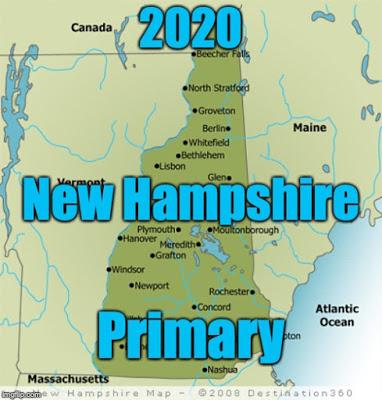 Will the New Hampshire primary critically affect the Democratic race for the presidential nomination?
Will the New Hampshire primary critically affect the Democratic race for the presidential nomination?Some say it won't because it is a small and mostly white state with only 24 pledged delegates. Others say it will because it could have an effect on how voters in other states cast their ballots.
Frankly, I'm not sure. But Jennifer Rubin has written an interesting article in The Washington Post. She says there are five questions that could be answered by the results of the New Hampshire primary.
Here are those five questions:
First, does Sen. Bernie Sanders (I-Vt.) have a low ceiling? In Iowa, Sanders did not bring in droves of new voters. In New Hampshire polling, he seems to have plateaued. In the debate he pitched his message squarely to the ultra-progressive wing of the party. If he does not break through to win a state in which he has been the overwhelming favorite (winning 60 percent in the 2016 primary), that will be a sign his prospects are limited. His opponents still have not done a very good job to date hitting Sanders as a rigid ideologue who continually votes against widely popular legislation. He is expert at making the perfect the enemy of the good, something that delights his followers but bodes ill for expanding his base. Unlike his rival senators, he voted against the U.S.-Mexico-Canada Agreement. He also voted against his party multiple times when it came to funding bills to keep the government open (which included items such as emergency funding for Puerto Rico and opioid treatment). A comfortable Sanders win should be a wake-up call for his opponents.
Second, will Sen. Elizabeth Warren (D-Mass.) fade? She once was dominating in the polls and the debates; she’s now generally in third or fourth place in state polling. Her debate performance on Friday, with the exception of an energetic response on race, was adequate but nothing special. If she places third in the first two contests, it is not clear what her path to victory would be. That does not mean she will drop out, but it may mean Sanders can finally consolidate the far-left vote.
Third, why not Sen. Amy Klobuchar (D-Minn.)? She has had several phenomenal debate performances in a row. Her campaign reported that she had raised a $2 million in less than 24 hours following the debate, suggesting she will have some resources to continue on. She can be formidable: No one is better than Klobuchar at taking down Sanders for ideological extremism and former South Bend, Ind., mayor Pete Buttigieg for lack of experience. Her feisty demeanor and moderate policy seem perfectly suited for a battle against President Trump. And yet she seems fenced in by Buttigieg and former vice president Joe Biden. In New Hampshire she may be the compromise choice for voters who think Biden is too seasoned and Buttigieg isn’t seasoned enough. She certainly does not need to win in New Hampshire, but a third-place finish or higher would supercharge her campaign.
Fourth, does New Hampshire throw Biden a lifeline? He surprisingly lowered expectations with a prediction in his first debate answer that he would not win in the Granite State, but a third-place finish or an underwhelming performance from Buttigieg could keep Biden’s hopes alive in Nevada and South Carolina. On Friday night he made a strong case that he has the best relationship with African American voters and is, by far, the candidate who is most comfortable with and expert on national security.
Fifth, do Democrats need to call on Mike Bloomberg? A big win for Sanders and — or — a muddle among the moderates in the race (Biden, Buttigieg, Klobuchar) likely will send establishment Democrats, however prematurely, into a frenzy. The terror about nominating Sanders, and thereby giving Trump four more years, is already palpable among some elected officials, donors and ordinary voters. In the early four states, Bloomberg benefits either from a strong Sanders showing (sending a signal that Democrats need a stronger moderate) or a split verdict (e.g., Buttigieg in Iowa, Sanders in New Hampshire, Warren in Nevada, Biden in South Carolina). No one should underestimate a candidate who is flooding the zone with ads and has more than 2,000 staffers around the country. Yes, this really could come down to a face-off between two white, male septuagenarians from the northeastern seaboard.

